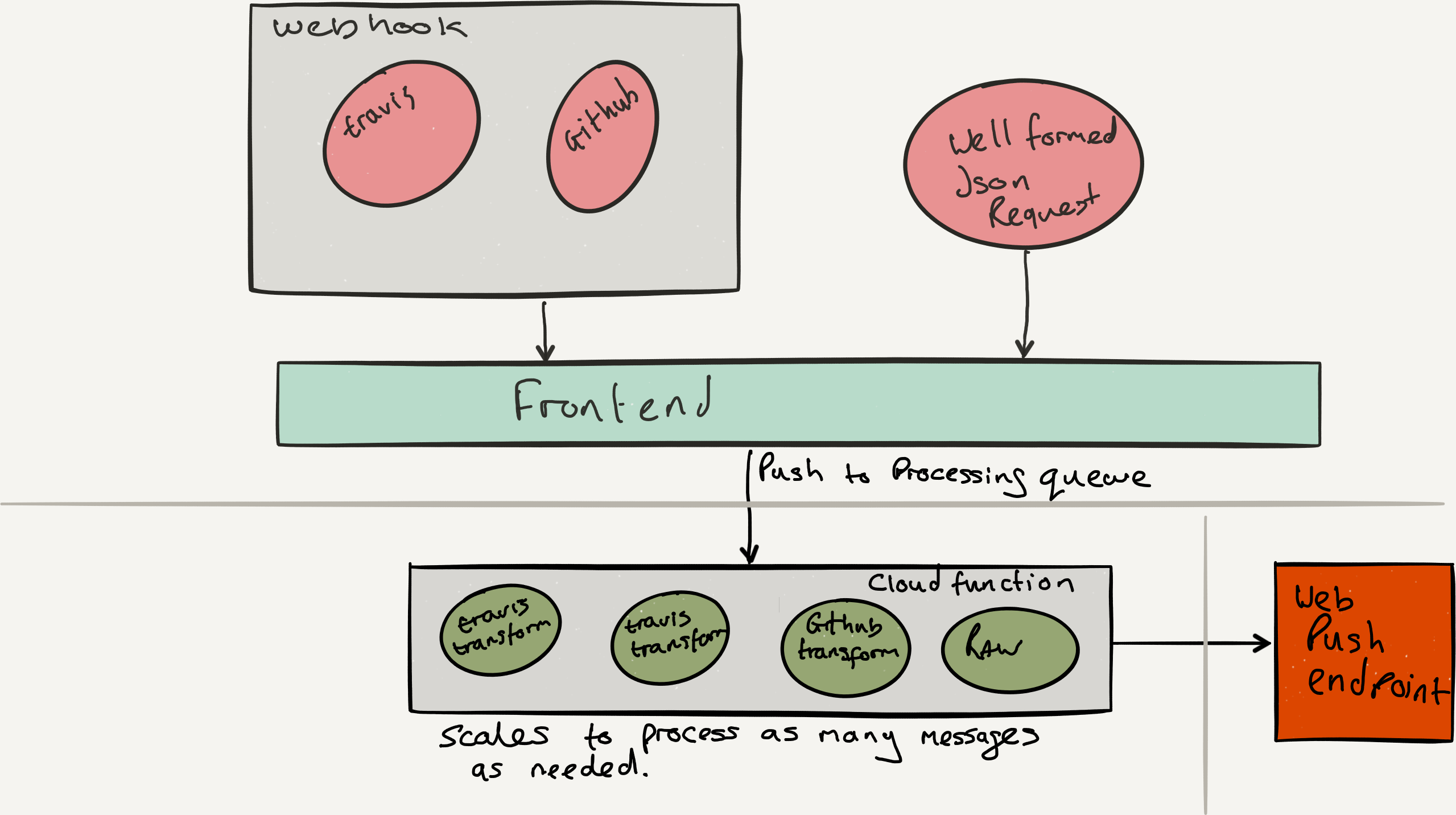I've been building out a quick sample that lets you quickly hook up an web push with a simple cURL request. The principle being that I would like to get integrations with third party APIs that currently don't support Web Push in any way.
The thing about webhooks is that they are not standarised in any way other than
you will most likely get a blob of data in a POST HTTP request, for example
Travis CI
application/x-www-form-urlencoded encodes the request data, whereas Github
will just put a JSON object as the POST
payload. Neither is wrong, they are
just different and each other webhook service will be different in their own way
too and I need to be able to handle that.
I decided to implement a small piece of functionality that would allow me to receive arbitrary web requests from a service (such as Travis or Github) and to apply custom logic on the messages so that I can output the data that is required for the web push notification.
The requirements that I had were:
- I wanted to contain logic for each type of data in it's own module
- I wanted process isolation so that anyone malicious message wouldn't bring down my service
- I wanted to be able to be able to scale quickly to an unknown number of requests.
- I didn't want to have to manage infrastructure
Given that I am on Google Compute Engine and I am always curious, I felt that Google Cloud Functions might be a good fit. GCF's are the same as Amazon Lambdas and they let me create a small unit of processing and scale it when the relevant system event happens (in my case, when a web hook request is received).
The architecture that I decided upon was roughly as follows.

I would have named queues for each service integration and a dedicated cloud function for each data processor.
The front end is not amazingly complex. It takes the web request that was
sent via a POST request to /send-raw and pushes the data on to the relevant
queue for processing by the cloud function that knows how to transform the data.
The code is relatively straight forward: receive the message, send it on for processing.
// parse application/x-www-form-urlencoded
app.use(bodyParser.urlencoded({ extended: false }))
// parse application/json
app.use(bodyParser.json())
app.post('/send-raw', (req, res) => {
const message = req.body;
const id = req.query.id;
const processor = req.query.processor;
// Topic must exist
const rawTopic = pubsub.topic(`projects/${project_id}/topics/send-${processor}`);
rawTopic.publish({
id: id,
processor: processor,
message: message
})
.then(() => res.send('ok'))
.catch(() => res.send('error'))
});
The Google Cloud function is set up as a subscription to the relevant queue and
when a message is on the bus it triggers the run function. The code
again is not too complex as Cloud Functions is taking care of all the scaling
and all I have to do is implement the naive transform from Travis CI's data
payload to the format I need to send the web push message.
/**
* Triggered from a message on a Cloud Pub/Sub topic.
*
* @param {!Object} event The Cloud Functions event.
* @param {!Function} The callback function.
*/
exports.run = function subscribe(event, callback) {
// The Cloud Pub/Sub Message object.
const pubsubMessage = event.data;
const data = JSON.parse(Buffer.from(pubsubMessage.data, 'base64').toString());
const id = data.id;
const msgObject = JSON.parse(data.message.payload);
const sendTopic = pubsub.topic(sendTopicId);
const transformedMessage = {
"title": `Travis: ${msgObject.repository.name} ${msgObject.status_message}`,
"description": `${msgObject.status_message}`,
"url": `${msgObject.build_url}`
};
// Send the push to the push sending service
sendTopic.publish({
id: id,
message: transformedMessage
});
// Don't forget to call the callback.
callback();
};
And voila!

I lead the Chrome Developer Relations team at Google.
We want people to have the best experience possible on the web without having to install a native app or produce content in a walled garden.
Our team tries to make it easier for developers to build on the web by supporting every Chrome release, creating great content to support developers on web.dev, contributing to MDN, helping to improve browser compatibility, and some of the best developer tools like Lighthouse, Workbox, Squoosh to name just a few.
I love to learn about what you are building, and how I can help with Chrome or Web development in general, so if you want to chat with me directly, please feel free to book a consultation.
I'm trialing a newsletter, you can subscribe below (thank you!)




